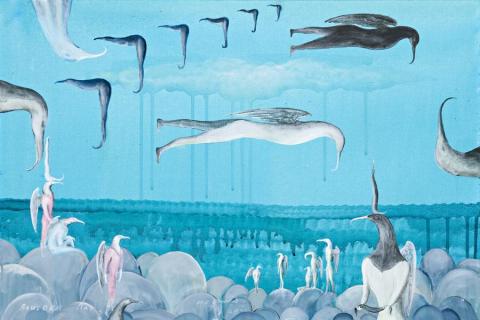BOULDER BAY 5, 2001
BILL HAMMOND
oil on canvas
40.5 x 60.0 cm
signed and dated lower centre: W. D.Hammond/ 2001
inscribed with title lower left: BOULDER BAY 5
Ivan Anthony Gallery, Auckland
Martin Browne Fine Art, Sydney
Private collection, Sydney
Bill Hammond is currently the subject of a major survey exhibition at Christchurch Art Gallery Te Puna O Waiwhetu, entitled Bill Hammond: Jingle Jangle Morning. The following excerpts are quoted from the essay by curator Jennifer Hay 'Jingle Jangle Morning' in the publication accompanying the exhibition, pp. 25-27
Hammond's well-documented epiphany in the Auckland Islands has become almost the stuff of legend...Travelling to the otherworldliness of the sub-Antarctic Auckland Islands south of Bluff with fellow artists Laurence Aberhart, Lloyd Godman and Gerda Leenards in 1990 initiated a transformation in Bill Hammond's practice that would culminate in the Buller paintings, begun in 1993, which instigated his rise to prominence in the New Zealand art world... The masses of birds staring out to sea, ruling the roost yet dangerously exposed to marauding bounty hunters; the salty, lonesome atmosphere; the ghosts of adventurers past - all captured Hammond's imagination as he transposed this vision of birdland onto a primordial depiction of New Zealand.
Victorian ornithologist and lawyer Sir Walter Lawry Buller (1838-1906), responsible for the killing and unprincipled trading of thousands of rare New Zealand native birds, is the ominous and shadowy inspiration for Hammond's Buller series. By exposing Buller's dubious ornithological activities, Hammond holds a mirror up to our post-colonial society. In these contemporary history paintings which feature his signature bird creatures, we are reminded of prismatic misdeeds of the past, and indeed of the recent debates regarding the discovery and ownership of New Zealand. While researching the islands, Hammond came across a copy of Buller's lavishly illustrated A History of the Birds of New Zealand (first published in 1873), which led him to discover more about the darker side of the author's ornithological work. Buller, a firm believer in the Darwinian theory of natural selection, regarded the demise of New Zealand's flora, fauna and indigenous as foreordained, so why not gather and sell these specimens while he could? He (along with many other 'bird stuffers') largely supplied English aristocrat Lord Rothschild, an avid collector of these valuable 'scientific' bird skins, who had concluded that such rarities might carry clues to the riddle of that Victorian obsession, evolution. Buller's voracious taste for collecting and trading rare birds helped drive some to extinction, notably the huia. The rarer the birds became, the more lucrative the trading; the thrill of discovery and having the lovely feathered creatures in glass cases thwarted any sense of moral duty toward their preservation...
The Buller series was pivotal in moving Hammond's work in a new, resolved direction that captured the attention of art critics and collectors alike. The wronged birds, suspended between this world and the next awaiting their ultimate fate, start to inhabit a surreal and verdant birdland now free, it seems, to express their revenge.
